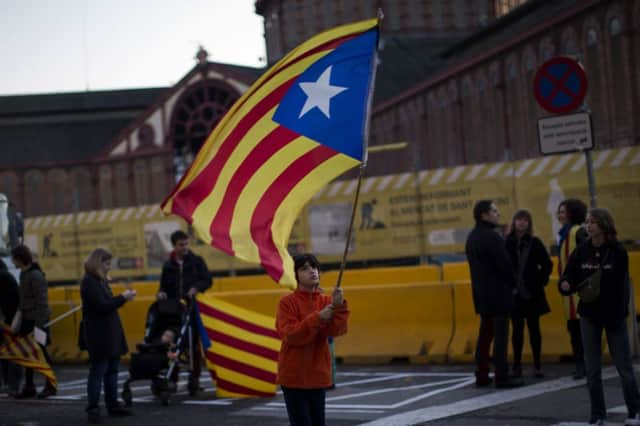Catalans vote on holding independence referendum


The Catalan parliament in Barcelona yesterday voted 87 to 43, with three abstentions, to send a petition to the national parliament seeking the power to hold a vote on the region’s future.
The independence movement in Catalonia, which has its own language and represents a fifth of Spain’s national economy, is a direct challenge to prime minister Mariano Rajoy, who has pledged to block a referendum on constitutional grounds.
Advertisement
Hide AdAdvertisement
Hide AdIndependence for the region, which already has significant self-governing powers, is considered a remote possibility but Catalan president Artur Mas is buoyed by a groundswell of public support to defy Madrid with plans for a referendum.
Polls show roughly half of Catalans want independence, but as many as 80 per cent want the right to vote on the matter.
Pro-independence leaders in Catalonia say Mr Rajoy should follow Prime Minister David Cameron’s stance – although he is against Scottish independence, he is not standing in the way of a referendum.
Outside the Catalan parliament, demonstrators gathered, both for and against staying in Spain. Many flew the separatist banner.
Demonstrator Isabel Guerrero said: “Rajoy is totally resistant to change. I don’t think he’s even aware of what is going on. He thinks this is a small spark that will fade away if he buries his head in the sand.”
Business and political leaders have piled pressure on Mr Rajoy to defuse the situation, perhaps by offering Mr Mas greater control over taxes in exchange for dropping the referendum idea.
Isidre Faine, chairman of Barcelona-based La Caixa, Spain’s third-biggest bank, this week called on Spanish and Catalan political leaders to negotiate a “grand pact”.
Mr Rajoy has refused to engage in public talks with Mr Mas.
Critics worry the prime minister’s inertia has fanned the flames in Catalonia. But time may once again be on Mr Rajoy’s side. Over the last two years he has successfully resisted pressure to seek an international rescue to ward off a sovereign debt default and to force out cabinet members or party leaders during a corruption scandal. Several factors play into his hands. Economic recovery could take off, easing tensions over tax distribution, one of Catalans’ main issues with the government.
Advertisement
Hide AdAdvertisement
Hide AdThe independence drive could falter over political tensions in Catalonia or on quiet opposition from big business. And, without international support, Catalans could balk at the idea of having to leave the European Union or give up the euro.
Yesterday’s vote in the Catalan parliament will trigger events that are likely to lead to stalemate.
First, the parliament in Madrid will almost certainly turn down the Catalan petition. Then Mr Mas will set a date without permission from Madrid, which the constitutional court will block.
Mr Mas has indicated that once all legal roads are exhausted, he will use Catalonia’s next regional election in 2016 as a proxy.